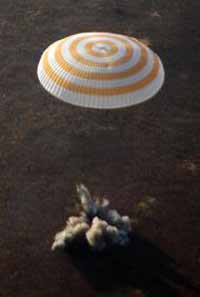Soyuz capsule lands successfully, but endangers the future of ISS project
The capsule of the Soyuz spacecraft with the crew of ISS-17 on board – Sergei Volkov and Oleg Kononenko and the sixth space tourist Richard Garriott – landed in the desert of Kazakhstan (a former republic of the Soviet Union in Central Asia), the Mission Control said. In the meantime, spokespeople for Russia’s space corporation Energia said that the further implementation of the International Space Station program was at risk because of insufficient funding.

The capsule landed at 7:36 Moscow time. Helicopters detected the capsule before it touched down and escorted it to the landing spot, Itar-Tass reports. When the recovery crew helped the cosmonauts out, they said that they had not had any problems during the landing and made no health complaints.
Alexander Volkov, the father of cosmonaut Sergei Volkov, and Owen Garriott, the father of the sixth space tourist, Richard Garriott, were present at the place of landing. Oleg Kononenko’s wife and their children, a boy and a girl, were observing the landing at the Mission Control.
It became the first successful landing after two ballistic descents of the previous crews.
Russian cosmonauts Volkov and Kononenko have spent 198 days on the orbit. US citizen Garriott arrived to the International Space Station on October 14 together with the crew of the 18th basic mission Yuri Lonchakov and Michael Fincke. They will be staying on board the ISS before the spring of the next year.
The ISS-17 mission was full of events. The crew accepted one shuttle, two Russian Progress spacecraft, unloaded Europe’s first cargo rocket ATV and loaded it with spent equipment.
In addition, the cosmonauts went on two spacewalks, one of which marked the first-ever experience in the history of Soyuz exploitation. Volkov and Kononenko conducted repairs in open space as they extracted one of the five pyrobolts, which became the reason for the ballistic descent of two spacecraft in a row – Soyuz TMA-10 and Soyuz TMA-11. The defective pyrocartridge was delivered to Earth for profound examination in order to exclude any future possibility of the unpleasant landing for cosmonauts. A ballistic descent is considered a regular measure, although cosmonauts are subjected to serious accelerations.
NASA astronaut Michael Fincke, 41, has become the new commander of the International Space Station.
Richard Garriott conducted his own scientific program during his ten-day presence on the ISS. The tourist was particularly observing Earth’s surface from space. He said that his father, NASA astronaut Owen Garriott, had an opportunity to observe Earth’s surface 35 years ago. Richard took pictures of the planet to find out how it changed during 35 years. The space tourist said that unfortunately, it would be easy to find the places which had changed for the worse. He set out a hope that he would find the locations with positive tendencies too.
Russia ’s Space Corporation Energia stated that the further implementation of the ISS program was at risk due to insufficient funding of the Soyuz spacecraft construction.
“If we receive neither advance payments nor loans during the upcoming two or three weeks, we will not be able to answer for the construction of Soyuz booster rockets,” Energia’s chief designer Vitali Lopota said.
Anatoly Perminov, the head of Roskosmos, said at the same time that Russia guaranteed all deliveries to the ISS despite the economic crisis.
Lopota said that the two-thirds of the budget of Energia Corporation were based on loans. “We received the directive from the government in the beginning of October, then the crisis occurred, and we have not received anything yet,” the official said.
The USA will shut down its shuttle programs in 2011, and Russia’s Soyuz rockets will become the only spacecraft to deliver the crews to the ISS and back. “I can not promise that we will abide to our obligations completely under the conditions of the financial crisis, although Russia guarantees the deliveries of the crews,” the head of Roskosmos, Anatoli Perminov said.
The government also assigned 200 billion rubles of the additional funding for the upcoming three years, the official added. “The money will allow to develop the project of a new manned spacecraft and build a new spaceport in Russia,” Perminov said at the press conference held after the landing of Soyuz TMA-12.
US astronauts will be able to fly to the International Space Station on board the Russian booster rockets only during 2010-2015. NASA will end its shuttle program in two years, whereas the new spacecraft, Constellation, will replace the shuttles in five more years only.
The delivery of astronauts to the space station will thus depend on Russia completely. Other countries will have to purchase their tickets to fly on board Soyuz rockets, like space tourists do now.
On the other hand, the future of the 15-year US-Russian space cooperation can be overshadowed with the conflict in Georgia and other issues. The cooperation between Russia and the USA within the framework of the ISS project will depend on the political relations between the two countries, the head of Roskosmos said.
Subscribe to Pravda.Ru Telegram channel, Facebook, RSS!
